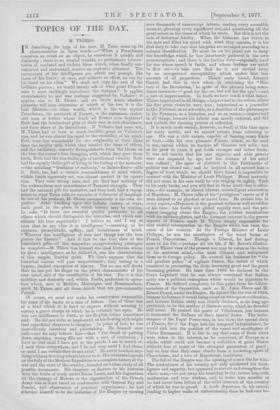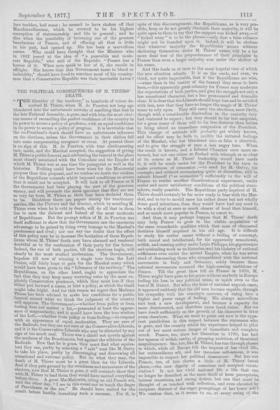TOPICS OF THE DAY • M. THIERS.
IN describing the type of his race, M. Taine sums up its characteristics in these words When a Frenchman conceives an event or an object, he conceives it quickly and distinctly ; there is no mental trouble, no preliminary fermen- tation of confused and violent ideas which, when finally con- centrated and elaborated, receive an explosive utterance. The movements of his intelligence are adroit and prompt, like those of his limbs ; at once, and without an effort, he can lay his hand on his ideas." We shall not copy the rest of the brilliant picture ; we would merely ask of what great French- man it most strikingly reproduces the features ? It applies unmistakably to, and was perhaps suggested by, Voltaire ; it applies also to N. Thiers; and we doubt much whether posterity will soon determine of which of the two it is the best likeness,---in other words, which is the true typical Frenchman, the patriarch of Forney, or the statesman, orator, and man of letters whose death all France now deplores ? Both had the intellectual gifts of their race in rich abundance, and their share of its limitations. If Voltaire had more wit, M. Thiess had at least as much lucidity, great as Voltaire's was, and he was almost his equal in the versatility of his mind. Both were less remarkable for the originality of their ideas than the facility with which they inhaled the ideas of others, and the brilliancy, scarcely distinguishable from the bloom on the true discoverer's first thoughts, with which they gave them forth. Both had the true Gallic gift of intellectual vivacity. Both had the equally Gallic gift of living in the feeling of the moment, —the unfailing "freshness of curiosity," as Sainte-Beuve calls it. Both, too, had a certain reasonableness of mind which, within limits rigorously set, was almost perfect in its opera- tion. They were strong men, and yet they had nothing of the awkwardness and uncouthness of Teutonic strength. They had the national gift for narrative, and they both had a repug- nance to what Taine calls les saccades et l'obscuriti of language. In one of his prefaces, M. Thiers unconsciously is his own ex- positor. After dwelling upon the infinite variety of ways, each good in its place, in which history may be written, he asks, "Is there one essential quality preferable to all others which should distinguish the historian, and which con- stitutes his true superiority ? I believe so, and I say at once that in my view it is intelligence "—meaning, as he explains, promptitude, agility, and incisiveness of spirit. "Whoever has intelligence of men and things has the true genius for history." And if this be the true view of the historian's gifts—if this somewhat meagre-looking catalogue be complete—M. Thiers was himself the ideal historian whom he drew ; intelligence, as he defined it, was the characteristic of this supple, fruitful spirit. We don't suppose that his historical canons will pass unquestioned ; they belong to a bygone, limited conception of history. But no one will doubt that he has put his finger on the prime characteristic of his own mind, and of the constitution of his race. For it is this mobility and dexterity and, within limits, perfection in opera- tion which, seen in Moli1re, Montaigne, and Beaumarchais, mark M. Pliers and all those minds that are pre-eminently French.
Of course, we must not make his countrymen responsible for some of his faults as a man of letters. One of these was of a kind which it is hard to express without seeming to convey a grave charge to which he is certainly not open. He was not indifferent to truth, as his English critics sometimes said. He did not write at haphazard, as his flowing style might lead superficial observers to imagine. In point of fact, he was marvellously laborious and painstaking. He himself once said—and we may believe him—that "the dread of putting down anything wrong fills me with a sort of confusion ; I have no rest until I have got at the proofs I am in search of. I seek them everywhere, and I do not stop until I find them, or until I am certain they do not exist." He never touched any- thing without devoting minute labour to it. His celebrated speech on the folly of the Mexican Expedition is a complete history of the war and the state of the country, founded on a close study of all possible documents. His chapters on finance in his histories were the fruits of study under Baron Louis, and his dogmatism on the strategy of Moreau or the organisation of the French Army was at least based on conferences with General Foy and Jomini, and observation of practical experiments ; he had echooled himself to be the historian of the Empire by turning over thousands of manuscript letters, reading every accessible memoir, gleaning every significant ?not, and questioning all the great actors in the times of which he wrote. But this is not the sum of historical fidelity. When the historian has drawn in his nets and filled his mind with what they contain, it is his first duty to take care that his gains are arranged according to a natural classification. He must be on his guard not to steep the knowledge which he has laboriously gathered in his own preconceptions ; and there is the further duty—especially hard' for one whose speech is facile, and whose feelings are quick to flow out—to take care that he is not carried away by an unregulated susceptibility which makes him lose account of all proportion. Thiess' early friend, Armand Carrel, had this in view when, in criticising the "His- tory of the Revolution," he spoke of the phrases being some- times incorrect—" good for the ear, but not for the eye"—and a sort of improvisation. In truth we here touch a vital defect, Pliers improvised in all things,—improvised in the salons, where his first great victories were won ; improvised as a journalist in the National, as an art-critic, as a describer of the picturesque in the Pyrenees, as a historian, and as an orator,—improvised in all things, because his labour was merely external, and did not include the ripening process of reflection.
It is much more seemly, however, to dwell at this time upon his many merits, and we cannot refrain from referring to one, His was a rich nature, capable of bearing many kinds of fruit,—like his own pleasant France, which, as he used to say, united within its borders all climates and soils ; and as he grew in years, it put forth stronger and better fruits. It was not merely that his rare sagacity and wide powers were not impaired by age, but the texture of his mind was refined ; the spice of diablerie in this Polchinello of politics was rinsed out ; and he inspired in all around him a degree of trust which we should have found it impossible to connect with the Minister of Louis Philippe. Moral maturity did not come in his case until he was verging on eighty. Turn to his early books, and you will find in them much that is offen- sive,—for example, an almost blatant, unintelligent admiration of Napoleon. M. Thiers talks of his "prodigious" career as if it were subject to no physical or moral laws. He praises him in every aspect,—Napoleon is the greatest writer as well as soldier. of his time ; his faults are glided rapidly over, and the per- sistent bragging about the Empire, the evident intoxication with its military glories, and the dormant interest in the graver. aspects of France, made M. Thiers deeply responsible for that wistful retrospection to the Empire which has been the curse of his country. As the Foreign Minister of Louis Philippe, he was the mouthpiece of the worst forms of French Chauvinism. Though a Liberal, he had during most of his life,—perhaps all his life, if Mr. Reeve's illustra- tion of Thiess' view of the present war may be taken as the index of his maturest mind,—the most illiberal and antiquated ideas as to foreign policy. He avowed his fondness for the old prudent policy" of vigilant States, the secret of which consisted in preventing the little becoming great and the great, becoming greater. No later than 1865 he declared in the Corps lAgislatif that he was always convinced that Italian Unity was a political conception which would be injurious to. France. He differed completely in this point from his fellow- members of the Opposition, such as M. Jules Favre and M. Ernest Picard, under the Empire. He did not like the war of 1859, because lie foresaw it would bring about an attempt at unification„ and because Italian unity was clearly destined, as he long ago, predicted, to be the mother of German unity, which he dreaded. still more. He praised the peace of Villafranca, just because_ it frustrated the Italians of their hearts' desire. The main- tenance of the Papal Power was, in his view, the special duty of France, for if the Pope lost his temporal independence, he would sink into the position of the vassal and mouthpiece of Victor Emmanuel. It is fair to say that some of these views were taken in the interest, as he conceived, of Europe as a whole, which could not become a collection of great States without loss of many of the strongest guarantees of peace ; but we fear that they came chiefly from a hectoring spirit of Chauvinism, and a love of Napoleonic traditions. The fall of the Empire was the opening of a new life for him. The misfortunes of his country not only quickened his intel- ligence and sagacity, but appeared to elevate and strengthen the whole man,—to put away his besetting levity, imbue him with moderation and true wisdom, and to make him sensible as he had never been before of the solid interests of the country of which he was so proud. A fresh departure in his career, leading to higher walks of statesmanship than he had ever be- Fore trodden, had come ; he seemed to have shaken off that Macchiavellianism, which he avowed to be his highest conception of statesmanship and life in general ; and he dies when the possibility of becoming one of the greatest benefactors of France, and of effacing all that is little in his past, had opened up. His has been a marvellous career. Who could have thought that the Minister who in 1832 jeered at the idea of "a peaceable and mode- rate Republic," who said of the Republic "France has a horror of it. When men speak to her of it, she recoils in affright. She knows that this Government turns to blood or imbecility," should have lived to convince most of his country- men that a Conservative Republic was their inevitable haven ?































 Previous page
Previous page